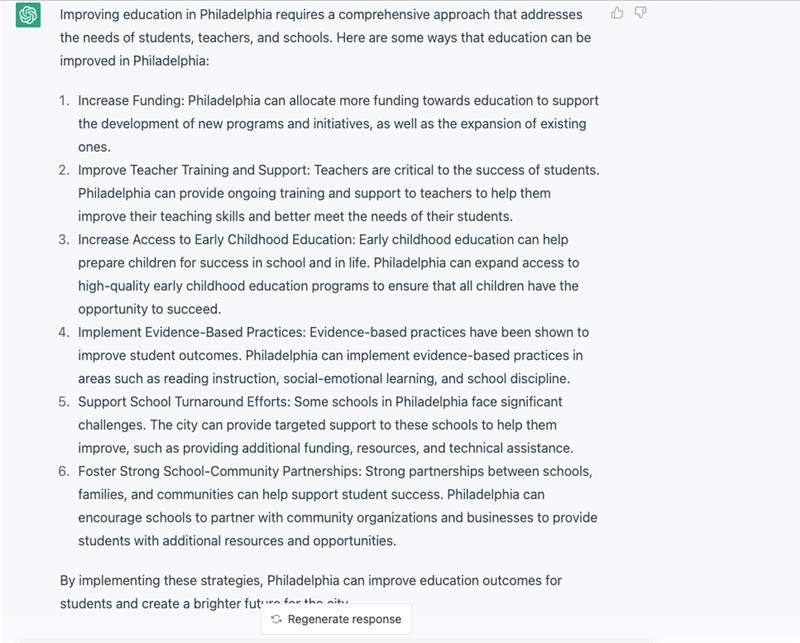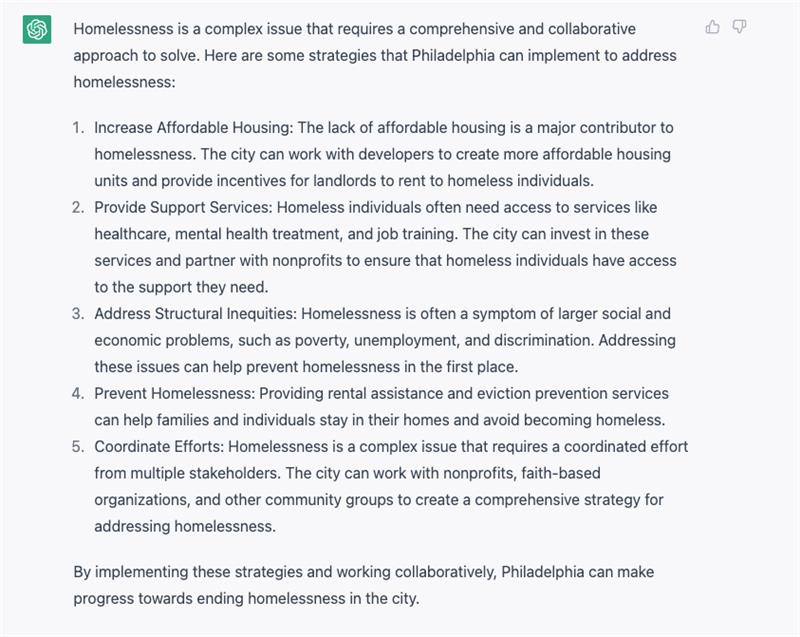Since its release in November, ChatGPT has seemingly done everything from producing advertisement scripts to writing code.
But can the artificial intelligence tool solve social problems in Philadelphia?
Generocity prompted ChatGPT to generate solutions for the most prominent social issue in Philadelphia, and asked experts to weigh in:
How can we end gun violence in Philadelphia?

(Screenshot via ChatGPT)
At first glance, these answers seem sufficient, but there must be more to it than that.
“[ChatGPT] is good at coming up with something that sounds pretty good. It’s sort of ‘convincing first and maybe factually accurate second,’ is a way I’ve heard people put it to me before,” said Pelle Tracey, a doctoral candidate studying algorithms in practice at the University of Michigan School of Information.
His research examines how the government uses technology to understand homelessness, highlighting how ChatGPT could function as a tool in Philadelphia.
“Querying ChatGPT isn’t going to give you something super different than just querying Google and spending a few minutes clicking around your top results,” Tracey said.
ChatGPT’s algorithms pull information from readily available sources on the internet, which, according to Tracey, is why they are not much different than something you might find on a city’s homelessness services page. But ChatGPT might still be relevant tool.
So, what does Philadelphia specifically need? We prompted ChatGPT to generate proposals for several roots causes of violence — a lack of or low-quality education, workforce development and housing — and gathered insights from local experts on them.
How can education be improved in Philadelphia?

(Screenshot via ChatGPT)
Maurice Baynard, VP of the Community Learning Division at the Academy of Natural Sciences of Drexel University, called for a similar need for human interpretation and intervention when it comes to improvements in Philadelphia’s education system, noting that ChatGPT’s responses were really just words.
“Information acquisition is not knowledgeable application,” Baynard said. “Simply being able to take all the information around education and … the things that most people say is not like understanding what actually moves the needle.”
Baynard acknowledged that solutions three and six — “increase access to early childhood education” and “foster strong school-community partnerships” — are pretty close to what he thinks is needed for better education, but also noted how sweeping and not Philadelphia-specific the other responses were, pointing out that the AI may not properly understand and consider the nuances involved in these issues.
“I feel like it assumes that teacher training is somehow lacking, and I’m not sure if that’s true,” Baynard said. “Teachers are actually highly trained, but perhaps, not trained on the challenges that they face in the Philadelphia School District.”
In Philadelphia, challenges include inadequate resources and high student-to-teacher ratios, neither of which are specifically addressed by ChatGPT.
In the city, these challenges include inadequate resources and high student-to-teacher ratios, neither of which are specifically addressed. ChatGPT’s first suggestion, to increase funding again, points to its limited Philadelphia-specific information. According to Farah Jimenez, CEO of the Philadelphia Education Fund, the city is not at liberty to allocate more funds as budgets are determined by taxes and state and federal funding. She, too, had concerns about specificity.
“What does it mean to increase funding in a way that’s actually impactful?” Jimenez said.
Based on the ChatGPT results, it’s not clear it knows the answer, and perhaps its information limitations impede its ability to provide answers that could promote impactful change. Jimenez, however, is not ready to write it off just yet.
“There was a time where you couldn’t have a calculator in the classroom,” Jimenez said. “And now with higher levels of math, having calculators in the classroom is actually expected.”
She said she can see a world where ChatGPT could function in a similar way, as a starting point or a way to open conversations and bring people into them.
How can workforce development be improved in Philadelphia?

(Screenshot via ChatGPT)
Latoya Edmond, regional director of CareerWork$, also sees the benefits of ChatGPT, but advises caution.
“There’s still an issue of the digital divide,” Edmond said. “A number of individuals in Philadelphia don’t really understand AI computer technology. And then there’s this huge gap there, so because of that, there is still going to have to be that human piece of it that can help bridge that gap.”
In her workforce development, she has seen the lack of trust some people have in social programs, feeling that available resources don’t accurately address the issues they face. Roberson expressed similar concerns about the welfare system being punitive toward people experiencing poverty. Removing the human aspects from these conversations could widen this divide.
“When it comes to being able to be successful, or retain employment and grow within workforce development, you kind of get there by your lived experience, and by the actual human interaction,” Edmond said. “And so, I kind of shy away from AI a little bit because of that.”
How can homelessness be solved in Philadelphia?

(Screenshot via ChatGPT)
Dionicia Roberson, associate editor of community narratives at Resolve Philly and an individual personally impacted by homelessness, was impressed by how structural the responses were and shared how even their lack of newness is valuable.
“It’s not telling us anything different, which points out that that was never our problem, right?” Roberson said.
According to Roberson, solving homelessness has never been a matter of finding answers, it was always a matter of implementation. ChatGPT has not adequately addressed what she says is the root of perpetuated homelessness — human disinclination.
“We have to convince people in neighborhoods that the homeless folks on their block, on their corner, are their neighbors,” Roberson said.
She advocates for the practical application of resources rather than policy pushing. This approach aims to apply information based on the experiences of people impacted by homelessness, instead of address issues broadly, as ChatGPT has done.
Can ChatGPT provide nonprofits and governments with solutions to our most pressing issues?
Despite being clear and structural, AI-generated responses need to be informed by experiences, community struggles and Philadelphia-specific factors to be applicable. And right now, they’re not. Still, Tracey said, this technology isn’t going away anytime soon.
“Integrating smarter data-driven tools into decision making processes is happening and will continue to happen,” Tracey said. “And that’s a good thing, but we shouldn’t view them as silver bullets.”
Ultimately, while AI may serve as a useful resource now and as it’s refined in the future, working towards social equity is still something humans need to be at the heart of.
This news article was written by Giana Longo for Generocity, where it originally appeared. It is republished here with permission.
Before you go...
Please consider supporting Technical.ly to keep our independent journalism strong. Unlike most business-focused media outlets, we don’t have a paywall. Instead, we count on your personal and organizational support.
Join our growing Slack community
Join 5,000 tech professionals and entrepreneurs in our community Slack today!

The person charged in the UnitedHealthcare CEO shooting had a ton of tech connections

From rejection to innovation: How I built a tool to beat AI hiring algorithms at their own game

Where are the country’s most vibrant tech and startup communities?

